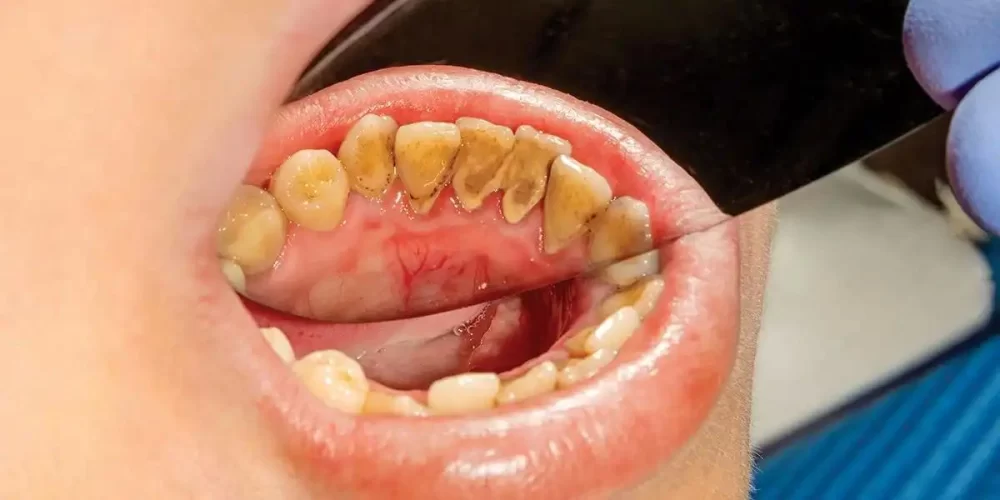
The Importance of Preventing Plaque Buildup on Your Teeth
Plaque is a sticky, colorless film of bacteria that forms on your teeth throughout the day. If not removed through proper oral hygiene, plaque can build up and harden into tartar, leading to a host of dental problems, including cavities, gum disease, and bad breath. Preventing plaque buildup is essential for maintaining good oral health and a beautiful smile. Understanding what plaque is, how it forms, and how to keep it under control is key to preventing dental issues in the future.
What Is Plaque and How Does It Form?
Plaque is a thin, sticky layer of bacteria that forms on the surface of your teeth. It is constantly forming as a result of food particles, saliva, and bacteria in your mouth. When you consume sugary or starchy foods, the bacteria in plaque feed on these sugars and produce acids that can erode tooth enamel and lead to cavities.
If plaque is not removed regularly through brushing and flossing, it begins to harden and turn into tartar, which can only be removed by a dentist. Tartar buildup can lead to serious oral health issues like gum disease and tooth decay, making it crucial to prevent plaque buildup from the start.
Common Causes of Plaque Buildup
Several factors contribute to plaque buildup, including:
- Poor Oral Hygiene: Not brushing and flossing regularly allows plaque to build up on your teeth and gums.
- Diet: Diets high in sugar, carbohydrates, and acidic foods provide the bacteria in plaque with the nutrients they need to thrive.
- Tobacco Use: Smoking or using smokeless tobacco can increase plaque buildup and make it more difficult to remove.
- Dry Mouth: A dry mouth reduces the flow of saliva, which helps wash away food particles and bacteria that cause plaque buildup.
- Braces and Dental Appliances: Braces, bridges, and other dental appliances can trap food particles and make it harder to clean your teeth properly.
Effective Strategies to Prevent Plaque Buildup
While plaque buildup is a natural part of oral health, there are numerous strategies you can implement to prevent it from becoming a serious problem. The following tips will help you maintain good oral hygiene and keep plaque under control:
1. Brush Your Teeth Properly
Brushing your teeth is the most effective way to remove plaque. It's essential to brush at least twice a day, using fluoride toothpaste. Be sure to brush for at least two minutes, making sure to reach all surfaces of your teeth, including the front, back, and chewing surfaces. Pay close attention to your gumline, as this is where plaque tends to accumulate.
Use a soft-bristled toothbrush to avoid damaging your gums. Additionally, consider using an electric toothbrush, which can help you brush more effectively and remove plaque more efficiently.
2. Floss Daily
Brushing alone isn't enough to remove plaque between your teeth. Flossing is crucial for cleaning the areas that your toothbrush can't reach. Make it a habit to floss at least once a day to remove food particles and plaque between your teeth and along the gumline. This helps prevent plaque buildup and reduces your risk of developing cavities and gum disease.
3. Use Mouthwash
Mouthwash can help reduce plaque buildup by killing bacteria in your mouth and freshening your breath. Look for a mouthwash that contains fluoride or antibacterial agents, as these ingredients can help kill the harmful bacteria responsible for plaque formation. Use mouthwash after brushing and flossing to get an extra layer of protection for your teeth and gums.
4. Maintain a Balanced Diet
Your diet plays a significant role in plaque formation. Foods high in sugar and refined carbohydrates provide the bacteria in plaque with the nutrients they need to thrive. To prevent plaque buildup, reduce your intake of sugary foods and drinks, such as soda, candy, and pastries. Instead, focus on a balanced diet that includes plenty of fruits, vegetables, and whole grains.
Incorporating foods that are rich in calcium, such as dairy products and leafy greens, can help strengthen your teeth and prevent plaque from sticking to them. Drinking plenty of water throughout the day also helps wash away food particles and bacteria.
5. Visit Your Dentist Regularly
Even with excellent at-home oral hygiene, plaque can still accumulate in hard-to-reach areas. That's why regular dental checkups and professional cleanings are essential. During these visits, your dentist or hygienist will remove any tartar buildup and check for any signs of cavities or gum disease. Regular dental visits also give your dentist the opportunity to identify any potential issues early, helping you avoid more serious problems in the future.
6. Quit Smoking and Avoid Tobacco Products
Smoking and using tobacco products can significantly increase your risk of plaque buildup, as well as gum disease and tooth decay. Tobacco use reduces the flow of saliva in your mouth, making it easier for plaque to form and harder for your body to remove it. Quitting smoking or using tobacco products can improve your oral health and reduce plaque buildup.
7. Consider Using Plaque-Control Toothpaste
There are many types of toothpaste designed specifically for controlling plaque buildup. These toothpastes often contain active ingredients that help prevent plaque from forming and reduce tartar buildup. Look for toothpaste that contains fluoride, as it strengthens tooth enamel and helps protect against cavities caused by plaque. You can also find toothpastes with added antibacterial properties to help reduce plaque-causing bacteria.
Real-Life Story: Overcoming Plaque Buildup
Meet Sarah, a 28-year-old woman who struggled with plaque buildup for years. She noticed that her gums bled when brushing, and her dentist informed her that she had early signs of gum disease due to plaque accumulation. Determined to improve her oral health, Sarah made a few key changes to her daily routine. She started brushing her teeth twice a day with fluoride toothpaste, flossing every day, and using an antibacterial mouthwash. She also made healthier food choices, cutting back on sugary snacks and drinking more water. After six months, Sarah's plaque buildup was significantly reduced, and her gums had returned to a healthy, pink color. Sarah's story is a reminder that with the right habits and dental care, you can take control of your plaque buildup and maintain a healthy smile.
Conclusion: Prevent Plaque and Protect Your Teeth
Plaque buildup is a common but preventable dental issue. By following good oral hygiene practices, maintaining a healthy diet, and visiting your dentist regularly, you can effectively prevent plaque from accumulating on your teeth. Protecting your teeth from plaque buildup is essential for maintaining your oral health and avoiding complications like gum disease, cavities, and tooth loss. Remember, small changes in your daily habits can make a big difference in your overall dental health.







 Joseph Spina III, DMD4.0 (40 review)
Joseph Spina III, DMD4.0 (40 review) Manhattan Dental Arts4.0 (394 review)
Manhattan Dental Arts4.0 (394 review) Tri City Endodontics5.0 (4 review)
Tri City Endodontics5.0 (4 review) Star Smiles Orthodontics4.0 (24 review)
Star Smiles Orthodontics4.0 (24 review) Sol Dental Group4.0 (11 review)
Sol Dental Group4.0 (11 review) Vanessa Thai0.0 (0 review)
Vanessa Thai0.0 (0 review) The Importance of Oral Health Education During Pregnancy for a Healthy Pregnancy
The Importance of Oral Health Education During Pregnancy for a Healthy Pregnancy Best Tips for Brushing Your Teeth Properly for Healthy Gums: Essential Techniques for Oral Health
Best Tips for Brushing Your Teeth Properly for Healthy Gums: Essential Techniques for Oral Health Why Skipping Dental Checkups Can Lead to Bigger Oral Health Problems
Why Skipping Dental Checkups Can Lead to Bigger Oral Health Problems Advantages of Porcelain Dental Restorations
Advantages of Porcelain Dental Restorations How Can Diabetes Cause Tooth and Gum Problems? Preventing and Managing Oral Health Issues
How Can Diabetes Cause Tooth and Gum Problems? Preventing and Managing Oral Health Issues Healthy Habits for Promoting Good Oral Health and Hygiene: Tips for a Healthy Smile
Healthy Habits for Promoting Good Oral Health and Hygiene: Tips for a Healthy Smile